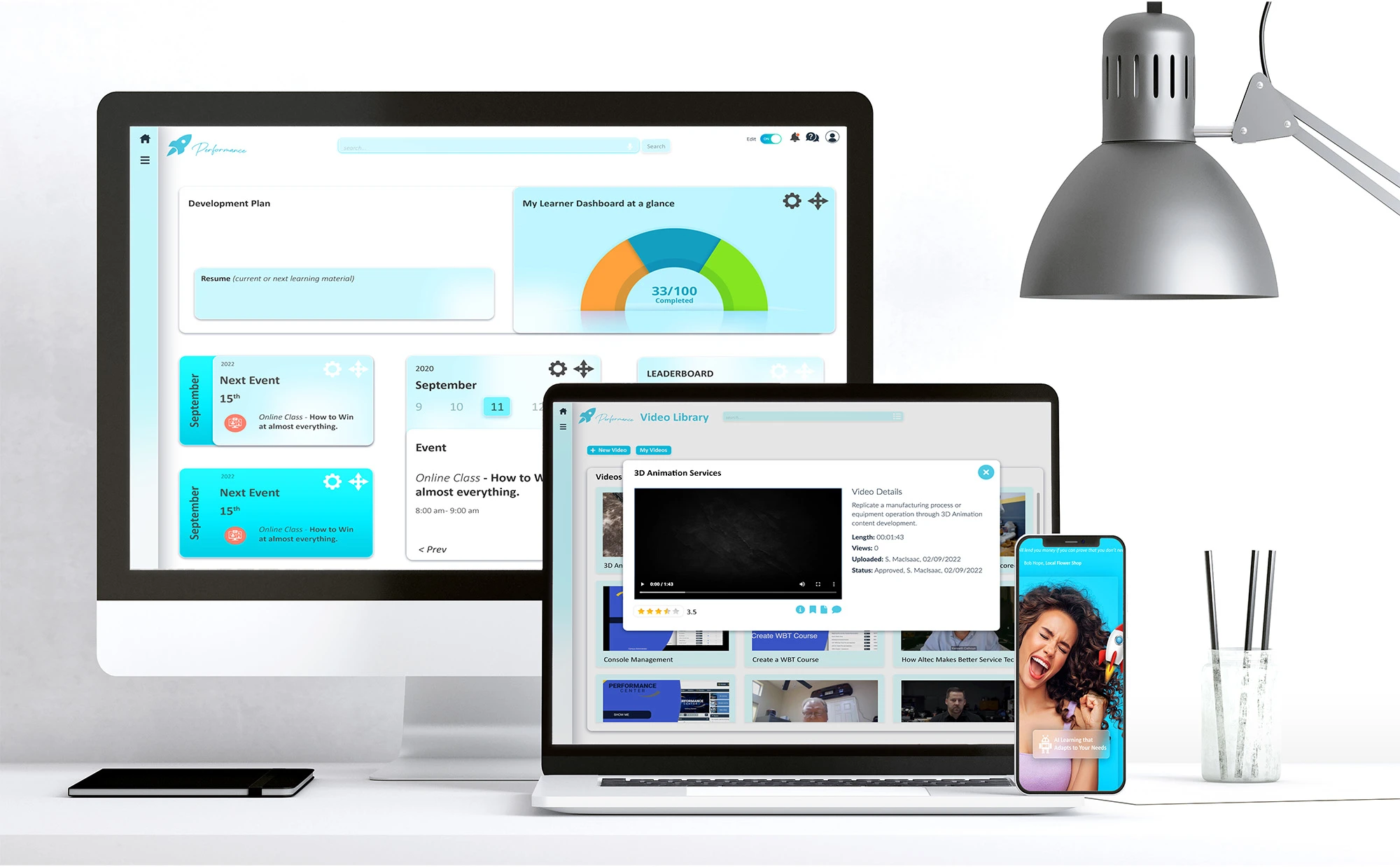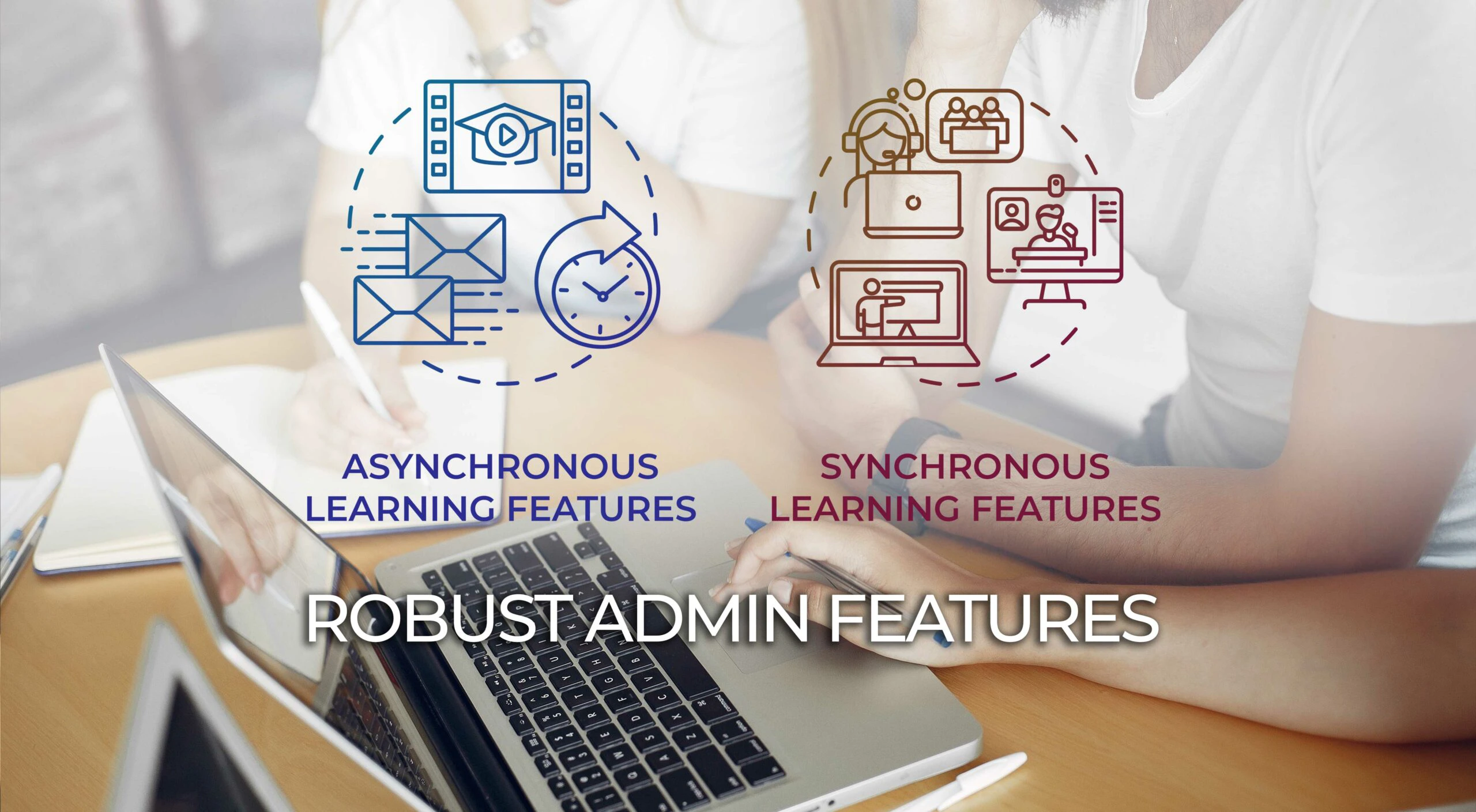
TLN’S Learning Platform
The Learning Network’s (TLN) Performance Learning Platform (“Performance”) is a robust, full featured Learning Management System designed to support everything from small, targeted business solutions to large, distributed enterprise learning environments. Combined with a robust content management system, granular access controls, and layout and branding tools, Performance can be configured to deliver the right content and training to the right people exactly as needed to drive performance.
Robust Learning Features
Performance offers a multitude of tools to drive learning goals. Asynchronous training and development features like standards-based content, videos, and documents can be easily managed alongside synchronous features like virtual and in-person instructor-led training and class calendars. This powerful combination includes full-featured support for administrators to manage instructor schedules, class resources, develop curricula and development plans, and track, report on, and reward learning with certificates, badges and goal completions.
Read More

Learning Experience
Delivering the right information to learners, managers and administrators is key. Performance allows organizations to provide exactly the right feedback to learners on their home page in a visually intuitive way that is aligned with business goals.
One of your learners may see a visualization of their progress towards being certified on a development goal alongside relevant job aids, while another may see a list of training and refresher training they are responsible for maintaining in order to work on site. With Performance, organizations have the ability to tailor learner screens to drive progress, individual development, and the learner experience.
Tailored Controls to Meet Business Needs
Performance comes with enough features and functions so that you can design exactly the solution you need. From complex hierarchies to simple courses and certifications, admins control everything. Additionally, the TLN team of learning and technology experts will work with you in the Set-Up Stage (more below) to best leverage the configuration engine to develop the experience you want for your learners.

PERFORMANCE LEARNING MANAGEMENT SYSTEM (LMS)
Courses
Courses are the basic building blocks for building your learning library and learning paths. A course is treated as an item of learning that one needs to complete in order to receive completion status. Performance supports a variety of course types that you can utilize as you consider designing and developing your digital and traditional training operation.
Classes
Classes allow you to deliver and track scheduled instances of instructor-led training courses with features such as:
- Registration periods and class size restrictions
- Instructor, location and resource scheduling and management
- Instructor qualifications
- Zoom and Microsoft Teams integration with attendance tracking
- Pre-work requirements
- Blended training with in-class self-paced modules
- Class grading and notifications
- Roster and waitlist management
Certifications and Curricula
Certifications are made up of one or more requirements groups. Requirement groups are a collection of courses, some or all of which must be completed to be awarded the certification.
The requirement groups can be reused across multiple certifications to represent sets of skill or knowledge, often used for role-based training. Learners and managers can track progress on certifications and a certificate is awarded upon completion.
Certifications support a variety of expiration models including annual expiration, expiration after a set number of days from acquisition, as well as a dynamic model that supports the addition of new requirements over time.
Development Plans
Development plans provide a way to create a detailed learning plan for learners using goals that are comprised of any number of activities. Target start and completion dates can be set for activities such that learners and managers can see how they are tracking to the plan.
Goal templates provide a means for managers and administrators to automate the assignment of goals to users based on job role, organization membership and other attributes.
Catalogs
Access to all training objects is controlled by catalogs which can be mapped to job roles, organizations, rule based groups and more.
Transcripts
Learners and their managers have access to transcripts that show the learners full training history – every course attempt, every certification acquisition and more. Learners can print their entire transcript or a single certificate for a completed course, certification, or curricula.
Analytics
Performance supports a wide array of reporting options to allow managers and administrators to get to the data they need to manage the performance and participation of learners. A large library of both spreadsheet-style reports and chart-style dashboards are available and support filtering, drilldowns, and automated delivery.
Language Support
Performance supports 12+ languages, time zone support, and currencies. Not only is the standard UI localized, Performance supports localized versions of content and training you create in the system.
eCommerce
Use the ecommerce feature to collect payment for registration and training via credit card, accounts, and purchase orders. Apply discounts both at a high level and at a learning object level using flexible pricing models.
Other Important Training Features
Prerequisites – Set courses, certifications and curricula as suggested or required training before taking a course.
Equivalents – Set a course as being equivalent to another within the context of a certification.
AI Recommendation – This automated feature leverages our AI recommendation engine to recommend training based on training users have already taken or training that others like them have taken.
Approvals – Leverage the flexible approvals feature to require approval for training from managers, instructors and administrators.
Attachments – Attach documents and other media to training objects to provide additional study materials, syllabi, directions, etc.


